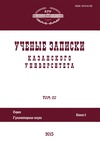Профессиональное самоопределение журналистов эпохи медиаконвергенции
Professional Self-Definition of Journalists in the Epoch of Media Convergence
Author(s): Alfred Ildarovich Shakirov, Marina Vladimirovna SimkachevaSubject(s): Media studies, Theory of Communication, Transformation Period (1990 - 2010)
Published by: Казанский (Приволжский) федеральный университет
Keywords: journalism; professional principles; professional problems; media sphere; universal journalist;
Summary/Abstract: The modern digital media environment is changing rapidly. Media experts are currently working in a multi- and trans-media environment, a global and interactive information space. Changes in the media sphere towards mobility and technological effectiveness over the past decade have not only contributed to a considerable advance in the field of media production, but also modified the principles of information functioning within society, thereby causing the transformation of professional attitudes among journalists and the audience’s media behavior. Journalists began to perform functions not peculiar to public journalism. In the media sphere, whole a number of professions appeared, all directly related to marketing, advertising, PR, etc. The ultra-high speed of work on different platforms simultaneously in the 24/7 regime does not change the basic value principles of journalism. What remains unchanged is that the ethical, humanistic components of the profession prevail in the minds of journalists. Nowadays, valuable specialists are those who can filter and select necessary information and focus their attention on the importance and usefulness for the audience, thus creating a competitive media environment. Such quality of a journalist as a system perspective on the world is appreciated. It implies the ability to see more extensively and deeply, the ability to break through the shroud of everyday life and transform reality at least slightly. The opinions of journalists on modern journalistic skills, such as the role of modern journalism and the attitude of society to it, journalist role and status, principles of this profession which are realized in media specialists’ minds, and modern interpretation by journalists themselves have been classified in the paper. Interviews with journalists were held in 2015–2017. The results of the study have been compared with our findings made in 2006.
Journal: Ученые записки Казанского университета. Серия Гуманитарные науки
- Issue Year: 160/2018
- Issue No: 4
- Page Range: 917-924
- Page Count: 8
- Language: Russian

